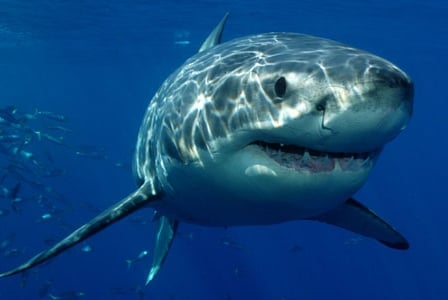
This Wildlife Wednesday, learn about the great white shark, and why sharks are more threatened by us than we are by them.
We’ve seen the great white shark on film and in the media for years, portrayed as a bloodthirsty villain. This Wildlife Wednesday, learn the truth about the great white shark, including the recent events putting it in jeopardy.
Habitat: temperate oceans, including the coasts of Australia, South Africa, and Northern California
Great white shark trivia
- It’s probably no surprise that great white sharks eat other animals, such as seals, dolphins, and other fish, but the National Geographic is quick to dispel the myth that humans are a favourite meal of the great white.
- Great white sharks are the world’s largest predatory fish.
- They sense their prey by using their sensitive sense of smell, and also by sensing the electromagnetic fields of its prey.
Why they’re threatened and what you can do to help
Humans are actually much more of a threat to sharks than they are to us. The great white, for instance, is classified as endangered, and it faces many threats.
They’re often hunted for their jaws, teeth, skin, and fins, which are considered very valuable.
- Like many other marine animals, they can become entangled in ocean debris, such as fishing gear or garbage.
- They are used to make the Asian delicacy shark fin soup (even though shark fins have no flavour or nutritional value).
Sharks are essential to the health of the oceans, as they help keep the delicate ecosystem in balance, so it’s important that their population recovers. Thankfully, there are things we can do to help, such as:
- reducing our use of plastic (which contributes to marine debris), and urging others to do the same
- purchasing sustainable seafood (which reduces bycatch)
- refusing shark fin soup
Happily, news sources have just reported that Vancouver is currently working to ban the sale of shark fin soup, following bans in other Canadian communities. Why not start a petition in your town?

















